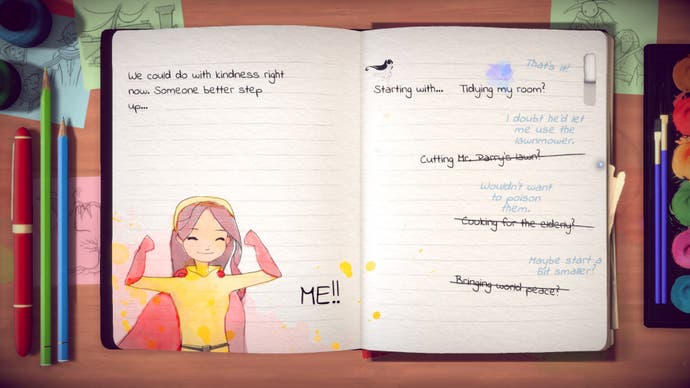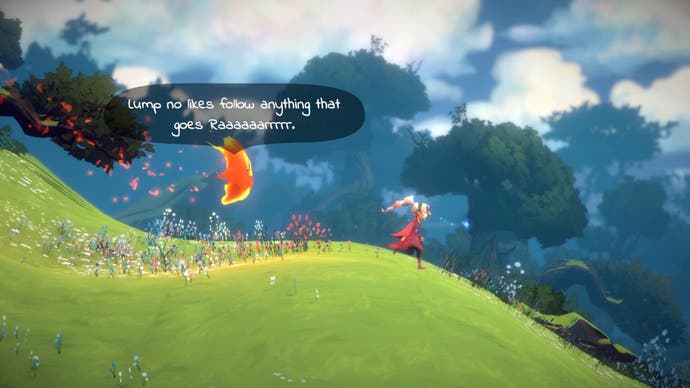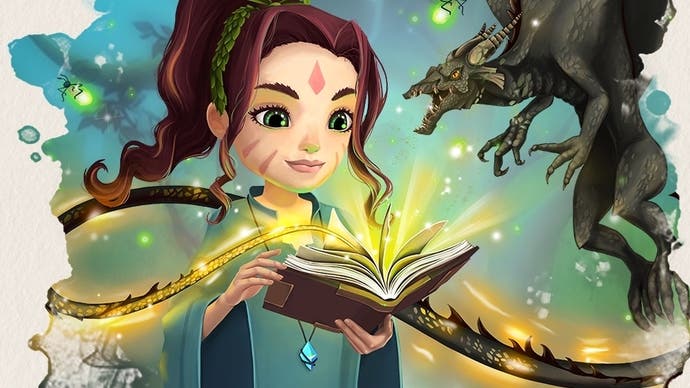Lost Words: Beyond the Page review - a simple, flawed yet beautiful adventure
The write stuff.
Scrambling over Izzy's words - literally; that's how we traverse here - I realise I don't want to carry on. My avatar - a small, faceless girl with dark, flowing hair who pirouettes onto each word with the grace and elegance of the ballerina I never could be - stands still as my fingers sit motionless on my controller. There's a little tear on the opposite side that signals it's time to turn the page, but I can't. I'm stuck. Not because I can't move, but because I don't want to. I know how this is going to end - we all know how this story ends.
It's been some time since I was the age of our protagonist. Like Izzy, I dreamed of being a writer and kept a journal through my formative years, vomiting my thoughts and desires and teenage angst onto the page in curly adolescent script. Like Izzy - like all of us - I've lost people I loved and didn't know how to endure the devastation it caused, nor the white-hot rage and howling emptiness that followed.
Knowing it was coming didn't even soften the blow, by the way. Lost Words: Beyond the Page gut-punched me in a way I didn't quite expect. It'd lulled me into a false sense of security, disguising itself as a simple, if beautiful, 2D platformer that marries two disparate games that, if I'm honest, lack a little challenge and sophistication. There are no hyper-real graphics or intricate animations here. No complex puzzling or dexterous platforming. Just a poignant tale of love and loss tangled up in a make-believe world.

Curiously, Lost Words - which is penned by noted game writer Rhianna Pratchett - casts you as not one but two young girls. On one hand, you're Isabelle, a wannabe writer experimenting with journaling for the first time. On the other, you're the central character in the story Izzy is writing. Her name depends upon your choice - there are a handful of story options you can choose and on this occasion, I chose to be Robyn - but whatever you're called, you'll be Guardian of the Fireflies in the magical kingdom of Estoria. After a dragon swoops down and devastates your little village, it's up to you to wander out into the big, wide world and gather up the missing fireflies once more.
Lost Words could've snipped off this fantasy portion of the game and I don't think we'd be any worse for it. Besides the allegories that add weight to Izzy's tumultuous tale, the journey of Robyn hangs a little inelegantly, and perhaps unnecessarily, on the otherwise unique concept of Izzy's journal. The word magic is a neat gimmick - you can raise heavy boulders by casting the "Rise" spell, or cross a ravine by using "Break" to fell a nearby tree - but they're not remotely taxing puzzles. Beyond's Izzy's own turmoil spilling out into her fictional story, it's not particularly compelling, either, and its supporting cast - an angry sprite; some snickering merchants; a meddlesome djinn - don't add the emotional depth you'd perhaps have expected.
That said? The climax of Robyn's tale was sublime. Both tender and pragmatic, it was a perfect close that made Izzy's own story all the more credible, one that dissolves preposterous notions of fairytale endings and infeasible happy-ever-afters, and hints at Izzy's blossoming maturity and acceptance. For in Robyn's resolution, Izzy also finds peace.

It's pretty, too. Bright backdrops - lush forests; windy sand dunes; subterranean caverns bubbling with molten lava; and soft, snowy mountain tops - frame your progression. A splendorous score accompanies you, too, waxing and waning as Izzy's imagination takes flight. Sometimes, you'll even scramble through Estoria in silence, your footfalls the only sound as though the kingdom silently mourns along with you.
Small details change as the game progresses. The detritus on the desk that frames your journal moves about as you play. One particularly sorrowful sequence blanches Estoria of colour entirely, leaving you traipsing through a monochrome world. But it's Izzy's words that matter most, and that's what makes the journal segments so much more engaging. Able to hurt and heal, her words are magical whether within or outside of her magical worlds. It's such a shame we don't see more of this.
The platforming is best in the journal, too. Here you'll literally race across Izzy's thoughts, helping her unravel her feelings and unleash them upon the page. Each word and sentence becomes a platform for your tiny, imp-like ballerina, and though you can miss jumps, you cannot perish here. Grabbing asterisks reveals additional flavour text, whilst repositioning torn-out words or sketches can be used to help you move Izzy on to the next page. Fully-voiced performances add welcomed nuance and shade to Izzy's scribbles, and her thoughts are often accompanied by stunning sketches that bring her thoughts to life. She is petty and thoughtful and childish and very, very real. And while, again, these sequences are rarely challenging, the interactivity of the page is considerably more charming than the time spent galloping through Estoria.
Performance wise? As we all huddle and self-isolate indoors, soaking up finite bandwidth, it's difficult to maintain a connection stable enough to complete a video call, let alone play a 4K video game. I suffered frequent slowdown, freezes, and stutters, but it's hard to lay the fault for that at the feet of Google when I've been having problems with Netflix, YouTube, Sky, and Xbox Live, too.
It does, however, perhaps posit a question of how viable a service like Stadia can be if internet service providers are struggling to meet demand. These are unprecedented times, of course, but it does perhaps intimate that cloud-streaming and the resources needed to maintain it might be more than our infrastructure can handle right now, perhaps? It certainly made me think again about committing to full-priced games on the streaming platform, anyway.
Lost Words: Beyond the Page is best suited for the burgeoning or casual gamer, offering a delightful, uncomplicated adventure with a relatable story and simple mechanics. It should appeal, too, to those who are content with simple gameplay and strong stories, such as "walking sims" like Everybody's Gone to the Rapture or What Remains of Edith Finch. Pratchett's writing is rich with the universal truths we all know and have experienced firsthand, which makes it hard - maybe even impossible - to hear Izzy's pain and not resonate with it. It might not be for everyone, granted, but it's a potent, powerful experience nonetheless.


